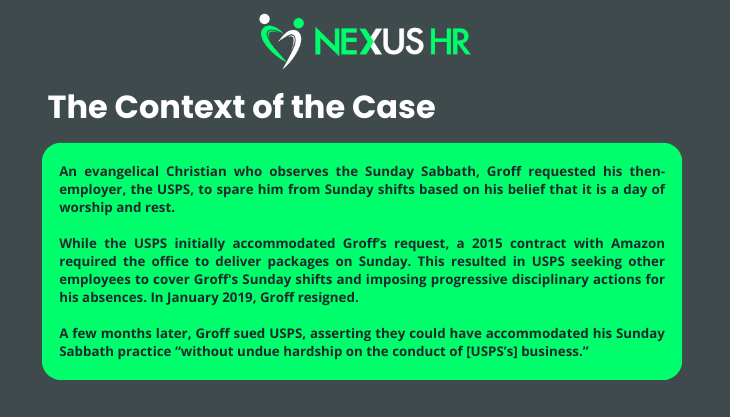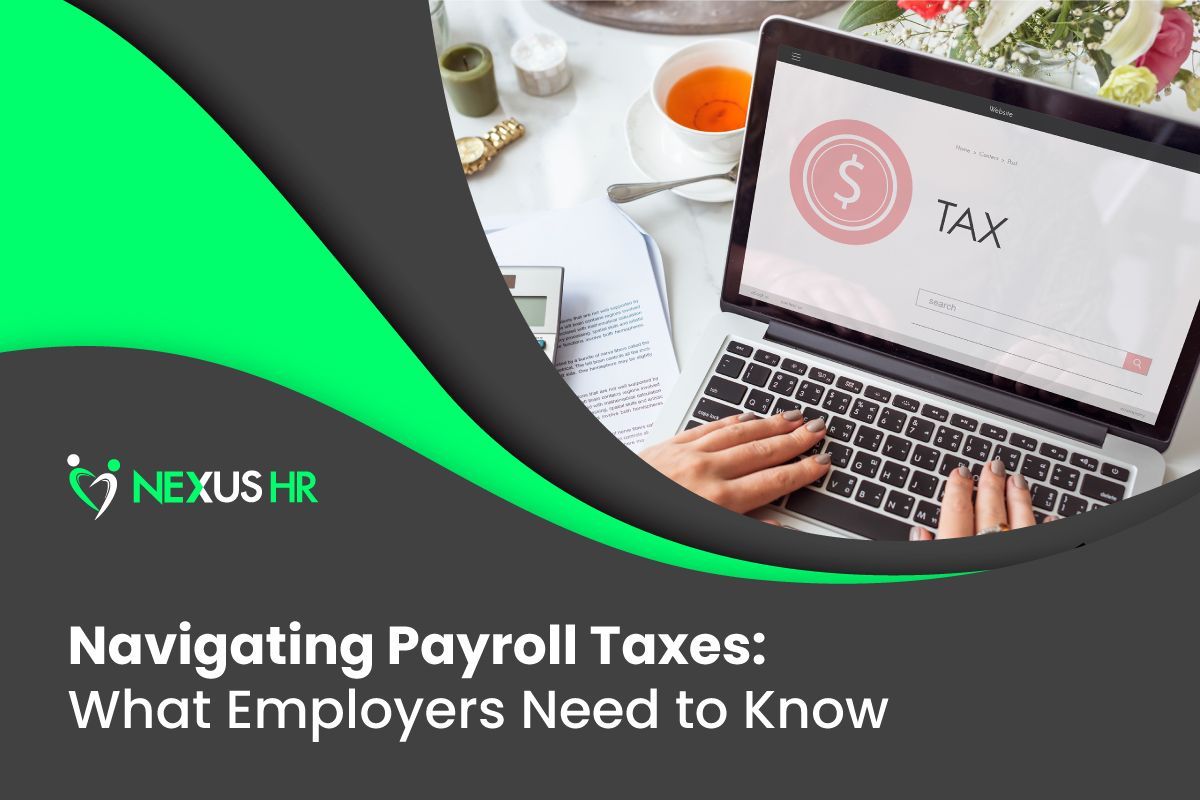Why You Need to Care About Religious Accommodation in the Workplace
For the first time in over four decades, the United States Supreme Court has addressed the issue of religious accommodation in the workplace.
In a
unanimous decision
on June 29, 2023, the Supreme Court ruled in favor of Gerald Groff, a former postal worker who sued the United States Postal Service (USPS) for failing to accommodate his religious beliefs and practices.
So what does this recent ruling have to do with your business? Well, a lot.
The
Groff v. DeJoy decision will make it harder for employers like you to deny your employees' requests for religious accommodation. And it may require you to scrutinize your organization’s current religious accommodation policy.
What is a Religious Accommodation Policy?

A religious accommodation policy is a set of guidelines and procedures an employer, organization, educational institution, or government body implements to accommodate an individual’s religious beliefs and practices in a respectful and nondiscriminatory manner.
Title VII of the Civil Rights Act of 1964 prohibits employment discrimination in the workplace based on religion. Discrimination can take various forms, such as refusing to hire, discharging, or segregating employees based on their religious beliefs, practices, or affiliations.
As a business leader and employer, the law compels you to make reasonable accommodations for employees whose religious beliefs, practices, or observances conflict with work requirements unless the requested accommodation would result in significant difficulty or expense to the business.
Read More:
Do You Know Your Employees’ Rights?
How Has the Groff v. DeJoy Case Changed Religious Accommodation Rights?

Since 1977, the United States has interpreted religious accommodation based on the Trans World Airlines, Inc. v. Hardison decision, which states that an employer can refuse to provide religious accommodation if doing so would impose more than a trivial, negligible, or minimal cost on the business.
Nearly half a century later, the
Groff v. DeJoy
case decision upended the long-standing legal precedent and created a new—much higher—standard for employers.
The Supreme Court
ruled that employers can only deny their employee’s request for a religious accommodation under federal law if they can prove it would result in
substantial
costs and difficulty for the business.
Common Examples of Religious Accommodation in the Workplace
Because employees may hold diverse religious beliefs and practices, understanding and providing religious accommodations are crucial to promoting a harmonious and respectful work environment.
Here are some real-life examples of religious accommodation requests in the workplace according to the
U.S. Equal Employment Opportunity Commission (EEOC):
Exemption to Company Dress and Grooming Code
- EEOC v. Brink's, Inc. - A Pentecostal Christian employee who does not wear pants or short skirts.
- EEOC v Alamo Rent-A-Car, LLC; ANC Rental Corporation - A Muslim woman who wears a hijab to work.
- EEOC v. Blockbuster, Inc. - A Jewish man who wears a yarmulke in the workplace.
- Air Force Approval - A Native American airman who wishes to grow his hair according to his Kanien'kehà:ka faith.
Because this is a frequent religious accommodation request, the U.S. EEOC has issued a
document to help employers like you address concerns regarding religious garb and grooming in the workplace.
Exemption from Events
- Young v. Sw. Sav. & Loan Ass’n - An atheist employee may not participate in a religious invocation at the start of monthly staff meetings.
Job Assignment Changes
- EEOC v. Dresser-Rand Co. - A Jehovah's Witness employee who does not wish to work on producing war weapons.
Work Schedule Changes
- EEOC v. JBS USA, LLC - A Muslim employee needs a break schedule that will allow him to observe his daily prayers at prescribed times during the workday.
- EEOC v. White Hall Nursing and Rehabilitation Center - A Seventh-Day Adventist employee who does not work from sundown on Friday to Saturday evening.
Read More:
How to Manage Time-Off Requests Like a (Good) Boss
3 Key Questions to Add to Your Religious Accommodation Policies

Organizations striving to foster an inclusive and supportive work environment understand the importance of keeping reasonable accommodation policies current.
By regularly assessing existing policies, you can proactively address the religious needs of your workforce, ensure compliance with legal requirements, and promote a culture of respect and understanding.
Based on the recent ruling in
Groff v. DeJoy, here are three questions you need to incorporate into your organization’s current religious accommodation policies:
Is the Requested Accommodation Causing Undue Hardship on the Business?
Contrary to the 1977 Trans World Airlines, Inc. v. Hardison ruling, the Groff v. DeJoy decision clarifies that an undue hardship means more than just imposing a minimal or negligible cost on the business. For an employer to refuse a requested accommodation, they must prove that doing so would burden the company with substantial costs.
According to the
Supreme Court, to determine the presence of undue hardship, you must evaluate the request’s practical impact on business operations based on the organization’s nature, size, and operating cost.
Read More:
What is People Analytics, and Why Does My Company Need It?
Does the Hardship Stem From Religious Intolerance?
If you find that approving an employee’s religious accommodation request causes undue hardship on the business, you need to ensure it does not stem from religious intolerance.
For example, a colleague’s dislike of religious practice and expression in the workplace is not enough to constitute undue hardship.
“A hardship that is attributable to employee animosity to a particular religion, to religion in general, or to the very notion of accommodating religious practice, cannot be considered undue,” wrote
Supreme Court Justice Samuel Alito.
“Bias or hostility to a religious practice or accommodation cannot supply a defense,” he added.
Read More:
5 Ways to Improve Inclusivity in the Workplace
Are There Alternative Ways to Fulfill Religious Accommodation Requests?
The law requires employers like you to do more than just assess the reasonableness of an employee’s requested accommodation; it compels you to make practical and fair efforts to respect and accommodate it.
Because every organization is unique, there is no universal formula employers can use to determine the answer to religious accommodation requests. Whenever you receive an appeal, always consider other options to fulfill them.
"Faced with an accommodation request like Groff's, an employer must do more than conclude that forcing other employees to work overtime would constitute an undue hardship,” wrote Justice Alito. “Consideration of other options would also be necessary."
To address similar requests, the
Society for Human Resource Management (SHRM)
recommends options like shift swapping, offering incentives to cover Sunday shifts, or coordinating with nearby postal facilities to involve a broader set of workers.
Foster a Culture of Inclusion and Support With Nexus HR

Accommodating your employees’ religious practices and beliefs is not just a matter of legal compliance; it’s a testament to your commitment to cultivating empathy and compassion in the workplace.
By recognizing and respecting diverse religious beliefs and practices, business leaders create an environment where everyone can bring their whole selves to the table, enabling them to thrive personally and professionally.
As a full-service human resource partner,
Nexus HR can help support you as you build, reevaluate, and improve your company’s religious accommodation policies.
Whether it’s developing inclusive recruitment strategies, assisting with
stay interviews, properly managing
payroll, or gathering employee data, our team of experienced
HR specialists is ready to help you create an inclusive and supportive work environment.












